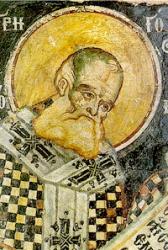
329 - 389 Person Name: Gregory of Nazianzus Meter: 8.7.8.7 Author of "Christ, for Thee a wreath adorning" in Hymns of the Greek Church Gregory of Nazianzus (St. Gregory Nazianzen), Bishop of Sasima and of Constantinople, son of Gregory, Bishop of Nazianzus in Cappadocia, and Nonna, his wife, was born at a village near that city where his father had an estate, and called Arizanzus. The date of his birth is unknown, but is generally given as A.D. 325. In early childhood he was taught to read the Scriptures by his mother. From his home he passed with his brother Caesarius to a school at Caesarea, the capital of Cappadocia, where he was instructed by one Carterius, supposed by some to be the same as the subsequent head of the monasteries of Antioch, and instructor of St. Chrysostom. At Caesarea he probably met with Basil, with whom he maintained a life-long friendship. From Caesarea Basil went to Constantinople, and Gregory and his brother to Caesarea in Palestine. In a short time his brother passed on to Alexandria, whilst he remained behind to study rhetoric, and then followed his brother to that city. From Alexandria he went to pursue his study at Athens. On his journey there the ship in which he sailed encountered a severe hurricane, so much so, that all despaired of life. The voyage, however, terminated safely, and Gregory felt his deliverance to be a fresh call upon him to devote himself to God. At Athens, Julian (the Emperor) was a fellow student, and there he also met Basil again, and rendered him much assistance. His studies at Athens extended over some ten years. About 356 he returned to Nazianzus, from whence, after great persuasion on the part of Basil he joined the latter at Pontus, and devoted himself for some two or three years to an ascetic life. On returning to his home the holy office of the priesthood was forced upon him by his father: but instead of exercising his office he fled to Pontus, only to return again in a few months.
Ordained, probably at Christmas, he preached his first sermon in the Church at Nazianzus on the following Easter-day, A.D. 362. In 370, through Basil, who had become Metropolitan of Cappadocia and Exarch of Pontus, Gregory consented most unwillingly to be consecrated as Bishop of Sasima. Subsequently he became for a short time his father's coadjutor at Nazianzus. About Easter, A.D. 379, he was called by the oppressed orthodox Christians of Constantinople to that city. The people's wish was supported by the voice of many of the bishops. He arrived there, it is supposed, about Easter. He found the adherents of the Nicene Creed few, and crushed by the heretics, and without a church in which to worship. His work, and the opposition he met with in that city, we cannot detail here. Failing health, and a dispute respecting the validity of his position as Bishop of Constantinople, led him, in A.D. 381, to retire to Nazianzus. After administering the affairs of that diocese for a short time he retired to his birthplace at Arizanzus, and occupied his remaining years--probably about six-—in writing poems, &c. He died cir. 390.
St. Gregory's extant writings were published in two folio volumes, the first in 1778; and the second in 1840. This is commonly known as the Benedictine edition and is entitled Sancti Patris nostri Gregorii Theologi vulgo Nazianzeni Archiepiscopi Constantinopolitani, Opera omnia quae extant vel ejus nomine circumferuntur, ad MSS. codices Gallkanos, Vaticanos, Germanicos, Anglicos, nee non ad antiquiores editiones castigata, &c, &c. Vol. i. contains 45 Sermons, and vol. ii. Letters on Various Subjects, and his poems. The latter are in two Books: Book. i. (1) dogmatic, (2) moral; Book. ii. historical, (1) relating to himself, (2) relating to others, including epitaphs, &c. The dogmatic poems are 38; the moral 40; those relating to his own life 99, and miscellaneous over 60. Many of these are given in the Anthologia Graeca Carminum Christianorum, and Daniel, iii. pp. 5, 16, and 8 are trans¬lated by Mr. Chatfield in his Songs and Hymns of the Greek Christian Poets, 1876. For fuller details of St. Gregory's Life and Writings, his works in ms. and book form and other matters relating thereto, see Dictionary of Christian Biographies., vol. i. pp. 741-761, and for criticism of his poetry, Greek Hymnody, § iv.
-- John Julian, Dictionary of Hymnology (1907)
St. Gregory of Nazianzus


 My Starred Hymns
My Starred Hymns



